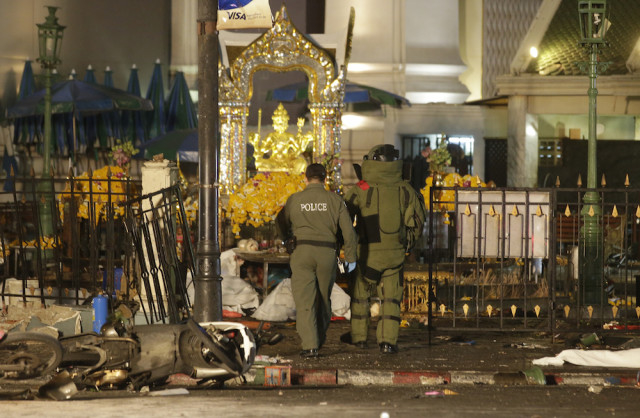A bomb on a motorcycle exploded on Monday just outside a Hindu shrine in the center of the Thai capital, killing at least 27 and injuring 78, police and a rescue worker said.
The victims included two foreign tourists — Chinese and Filipino — according to Thai police, in an attack the government said was a bid to destroy the economy.
There was no immediate claim of responsibility for the blast at the Erawan shrine at a major city-center intersection. Thai forces are fighting a low-level Muslim insurgency in the predominantly Buddhist country’s south, but those rebels have rarely launched attacks outside their ethnic Malay heartland.
“The perpetrators intended to destroy the economy and tourism, because the incident occurred in the heart of the tourism district,” Defence Minister Prawit Wongsuwan told Reuters.
The government would set up a “war room” to coordinate the response to the blast, the Nation television channel quoted Prime Minister Prayuth Chan-ocha as saying. Domestic media said 27 people had been killed, 10 of them men and 17 women, according to China Daily.
At least two bombs were found at the scene, said Maj. Gen. Weerachon Sukhondhapatipak, a spokesman for Thailand’s ruling junta. He said at least one had detonated.
The first bomb was found inside the shrine compound, while the second was found opposite the complex, Weerachon said.
A Reuters witness at the scene said she saw pieces of human flesh near the blast site, and a soldier later told onlookers to move back, saying they were checking for a second bomb.
The Chinese Embassy in Bangkok initiated its emergency response system and is verifying the casualties among Chinese nationals after the explosion.
Car bombs are almost unknown in Bangkok, but have been used in southern Thailand, where a Muslim separatist insurgency has been flaring for several years.
Thai forces are fighting a low-level Muslim insurgency in the predominantly Buddhist country’s south, although those rebels have rarely launched attacks outside their ethnic Malay heartland.
The country has also been riven for a decade by intense and sometimes violent rivalry between political factions in Bangkok and elsewhere.
The army has ruled Thailand since May 2014, when it ousted an elected government after months of, at times, violent anti-government protests.
The Erawan shrine, on a busy corner near top hotels, shopping centres and offices, is a major tourist attraction, especially for visitors from East Asia. Many ordinary Thais also worship there.
Report compiled from China Daily, Reuters, and AP wire stories
 CGTN America
CGTN America Explosive Ordnance Disposal officers enter the Erawan Shrine after an explosion in Bangkok, Monday, Aug. 17, 2015. A large explosion rocked a central Bangkok intersection during the evening rush hour, killing a number of people and injuring others, police said. (AP Photo/Sackchai Lalit)
Explosive Ordnance Disposal officers enter the Erawan Shrine after an explosion in Bangkok, Monday, Aug. 17, 2015. A large explosion rocked a central Bangkok intersection during the evening rush hour, killing a number of people and injuring others, police said. (AP Photo/Sackchai Lalit)
